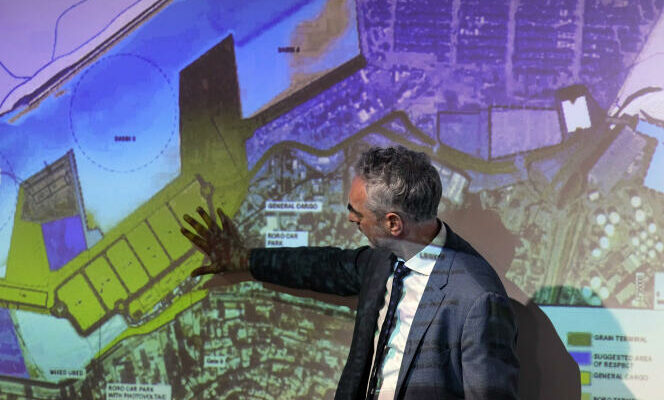Since the explosion on August 4, 2020, the reconstruction of the port of Beirut has been attracting attention. France pushed its advantage by unveiling, on Wednesday March 13, a proposal prepared by the engineering companies Artelia and Egis, and EDF for the photovoltaic component, in coordination with the Lebanese Ministry of Transport and the Beirut port authorities. This plan provides for investments of around $50 million to $80 million (between €46 million and €73 million) to rehabilitate and redevelop the port area located between the container terminal and the military port.
“The plan is accepted, and port revenues will be used to finance the required investments”as suggested by the French proposal, confirmed at World the Minister of Public Works and Transport, Ali Hamie, during the presentation which he attended alongside the Prime Minister, Najib Mikati. The main source of state revenue, the port of Beirut is recording increasing revenues after suffering the effects of the economic and financial crisis of 2019, the Covid-19 pandemic and the explosion. In 2023, its revenues will reach $150 million, said the port’s general director, Omar Itani.
“The Lebanese economy needs a reconstructed, modernized and secure port”, pleaded the French ambassador to Lebanon, Hervé Magro. Paris, which has made the Beirut port issue a priority and one of the pillars of French cooperation in the Land of the Cedars, has succeeded in asserting itself on the issue. Crucial steps nevertheless remain to be finalized, on the Lebanese side, to implement this plan, such as the clearance of waste in the port area, the financing plan and the reform of port governance.
Exchanges of expertise
President Emmanuel Macron very early on expressed France’s interest in this project. The first foreign head of state to visit Lebanon after the disaster, on August 6, 2020, he returned there a month later with the Franco-Lebanese CEO of the CMA CGM group, Rodolphe Saadé. The plan that the latter presented to build a smart port (“smart port”) remained unanswered. The maritime transport giant nevertheless won, at the beginning of 2022, with the strong support of Paris, the concession for the container terminal at the port of Beirut for ten years. It plans to invest $33 million to modernize the terminal, which provides the port with most of its returns.
Other proposals have been ruled out, such as the ambitious $30 billion project, presented in April 2021 by a consortium of German shipping companies, including Hamburg Port Consulting, to rebuild the site and redevelop the adjacent neighborhoods. The Lebanese authorities opted for the development of a plan presented as more “pragmatic” by the French side. The ambition is for Beirut to once again become an international port, focused on imports and exports, but commensurate with the country’s resources. International investors and donors still refuse to finance reconstruction in the absence of structural reforms.
You have 48.64% of this article left to read. The rest is reserved for subscribers.
